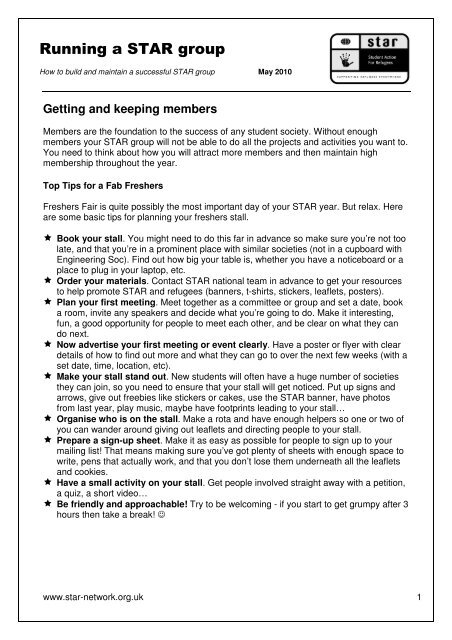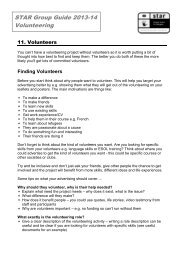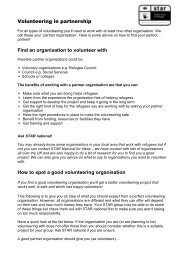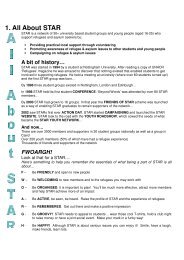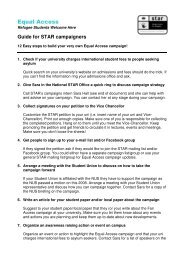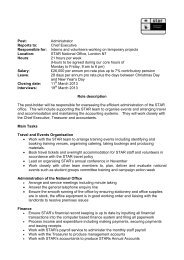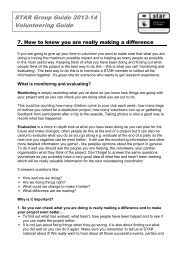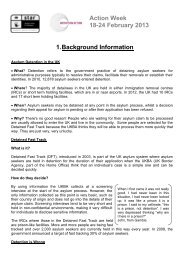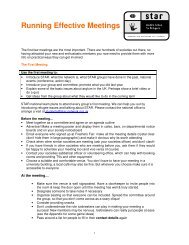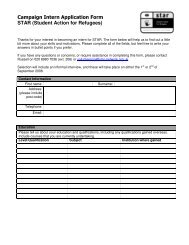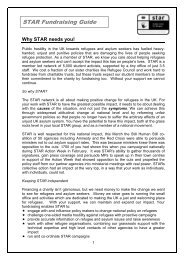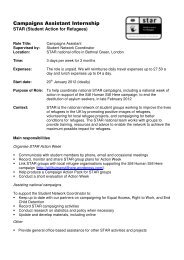Running a STAR group - Student Action for Refugees
Running a STAR group - Student Action for Refugees
Running a STAR group - Student Action for Refugees
You also want an ePaper? Increase the reach of your titles
YUMPU automatically turns print PDFs into web optimized ePapers that Google loves.
<strong>Running</strong> a <strong>STAR</strong> <strong>group</strong><br />
How to build and maintain a successful <strong>STAR</strong> <strong>group</strong> May 2010<br />
Getting and keeping members<br />
Members are the foundation to the success of any student society. Without enough<br />
members your <strong>STAR</strong> <strong>group</strong> will not be able to do all the projects and activities you want to.<br />
You need to think about how you will attract more members and then maintain high<br />
membership throughout the year.<br />
Top Tips <strong>for</strong> a Fab Freshers<br />
Freshers Fair is quite possibly the most important day of your <strong>STAR</strong> year. But relax. Here<br />
are some basic tips <strong>for</strong> planning your freshers stall.<br />
Book your stall. You might need to do this far in advance so make sure you’re not too<br />
late, and that you’re in a prominent place with similar societies (not in a cupboard with<br />
Engineering Soc). Find out how big your table is, whether you have a noticeboard or a<br />
place to plug in your laptop, etc.<br />
Order your materials. Contact <strong>STAR</strong> national team in advance to get your resources<br />
to help promote <strong>STAR</strong> and refugees (banners, t-shirts, stickers, leaflets, posters).<br />
Plan your first meeting. Meet together as a committee or <strong>group</strong> and set a date, book<br />
a room, invite any speakers and decide what you’re going to do. Make it interesting,<br />
fun, a good opportunity <strong>for</strong> people to meet each other, and be clear on what they can<br />
do next.<br />
Now advertise your first meeting or event clearly. Have a poster or flyer with clear<br />
details of how to find out more and what they can go to over the next few weeks (with a<br />
set date, time, location, etc).<br />
Make your stall stand out. New students will often have a huge number of societies<br />
they can join, so you need to ensure that your stall will get noticed. Put up signs and<br />
arrows, give out freebies like stickers or cakes, use the <strong>STAR</strong> banner, have photos<br />
from last year, play music, maybe have footprints leading to your stall…<br />
Organise who is on the stall. Make a rota and have enough helpers so one or two of<br />
you can wander around giving out leaflets and directing people to your stall.<br />
Prepare a sign-up sheet. Make it as easy as possible <strong>for</strong> people to sign up to your<br />
mailing list! That means making sure you’ve got plenty of sheets with enough space to<br />
write, pens that actually work, and that you don’t lose them underneath all the leaflets<br />
and cookies.<br />
Have a small activity on your stall. Get people involved straight away with a petition,<br />
a quiz, a short video…<br />
Be friendly and approachable! Try to be welcoming - if you start to get grumpy after 3<br />
hours then take a break! ☺<br />
www.star-network.org.uk 1
Making your <strong>group</strong> attractive<br />
How are you going to make your society the one that everyone wants to join? And how<br />
can you make sure that members stay interested and enthusiastic throughout the year?<br />
Below are some ideas on the ‘good’ and the ‘not so good’ <strong>for</strong> getting and keeping<br />
members.<br />
A Good Society will:<br />
Have clear aims. Be clear on why the <strong>group</strong> exists and what you hope to achieve.<br />
Build a sense of identity and set goals <strong>for</strong> the <strong>group</strong> to work towards together.<br />
Be Active. Have a variety of opportunities to get involved, follow through on your<br />
plans, have regular activities to keep people interested.<br />
Be a good way to meet new people. This means meetings with an opportunity to<br />
chat and get to know each other, projects which involve teamwork, and of course<br />
socials!<br />
Fun! <strong>STAR</strong> is serious about improving the lives of refugees, but we can have fun<br />
while we do it! Bringing the student and refugee community together is something to<br />
celebrate!<br />
Offer responsibility. Delegate tasks to the <strong>group</strong>, offer the chance <strong>for</strong> new<br />
members to join the committee or lead on new events or projects<br />
Offer new Experiences. Give people the chance to try new things and gain<br />
experience in something valuable.<br />
Offer personal development. If your <strong>group</strong> can offer training, the chance to learn<br />
about different issues, opportunities to develop skills, then make it obvious!<br />
Make a difference. Show people what you do, how they can really make a<br />
difference, and celebrate your achievements!<br />
Be contactable. It is important that all members of the society can easily contact<br />
the committee members so that they feel involved in the running of the <strong>group</strong> and<br />
they can get in<strong>for</strong>mation when needed.<br />
A Society to be Proud of. A lot of the above adds up to being a <strong>group</strong> that people<br />
want to be a part of – an active, vibrant, fun, unique <strong>group</strong> that makes a real<br />
difference!<br />
Try to avoid:<br />
Not keeping commitments. Don’t bite off more than you can chew! If you don’t<br />
follow through on your plans, members might lose interest and think you’re all talk.<br />
Being Disorganised. Any <strong>group</strong> or organisation that appears out of control and<br />
unclear on what it’s doing will be off-putting <strong>for</strong> potential members.<br />
Operating ‘Top down’. If all ideas and decisions come from a few people at the top<br />
without discussion or consultation then you risk making people feel they are not part<br />
of the <strong>group</strong>.<br />
Assuming knowledge or experience. Some members may be new to working<br />
with refugees or campaigning. Make your <strong>group</strong> an opportunity to learn, not one<br />
that makes unfair demands. Help people grow in confidence through<br />
encouragement.<br />
Demanding too much time. People will vary in how much they can commit and<br />
this will change throughout the year, so give people a range of things to get<br />
involved with – some one-off opportunities and other regular requirements.<br />
Being Exclusive. Make sure it’s not just a <strong>group</strong> <strong>for</strong> you and your friends. Involve<br />
www.star-network.org.uk 2
everyone in <strong>group</strong> activities, try to avoid making important decisions or plans<br />
amongst yourselves outside of meetings, or having socials with only a select few<br />
invited from the <strong>group</strong>.<br />
Being unclear on what you do. Provide clear in<strong>for</strong>mation and explain fully in<br />
meetings who you are and what you do – don’t assume everyone already knows!<br />
Being too ideological / political. <strong>STAR</strong> is about supporting refugees, but your<br />
<strong>group</strong> should encourage as wide a spectrum backgrounds and opinions to get<br />
involved. Don’t require that everyone agrees with you about everything!<br />
Raise your profile<br />
You can be the most perfect society in the world but not have enough members if nobody<br />
knows you’re there! You need to make sure that as many people on campus know that<br />
there is a <strong>STAR</strong> <strong>group</strong> at their university and that if they are interested in refugees you’re<br />
the <strong>group</strong> to contact. Think about these ideas <strong>for</strong> raising the profile of your <strong>group</strong>:<br />
Facebook. Start and develop a <strong>group</strong>. An easy way to advertise, send messages<br />
and discuss your plans.<br />
Website / blog. Start your own by trying www.blogger.com or www.wordpress.com<br />
Be visible. Check the Union Diary <strong>for</strong> events such as "One World Festivals" and<br />
"International Weeks" which you could book stalls at and/or organise events <strong>for</strong>.<br />
Use <strong>STAR</strong> brand. Put the <strong>STAR</strong> logo on all your posters, flyers and leaflets so<br />
people get to recognise it, and wear your <strong>STAR</strong> t-shirts and hoodies<br />
Build coalitions with similar <strong>group</strong>s. Good relationships with other societies can<br />
have loads of mutual benefits from free advertising and sharing contacts, to joint<br />
events and practical help.<br />
Contact with university departments. See if you can advertise on departmental<br />
notice boards or contact lecturers and departments who you think may have a<br />
natural fit with your <strong>group</strong>s aims and interests.<br />
Design your own posters. Make them distinctive and eye catching and display<br />
them in novel places. Build a consistent brand, with the same font, your own slogan,<br />
a clear contact or place to find more in<strong>for</strong>mation.<br />
Use student media. Radio, TV and newspapers are always on the look out <strong>for</strong><br />
quirky or interesting stories. So give them some!<br />
<strong>STAR</strong> website. Write a news story about your <strong>group</strong> and send it to students@starnetwork.org.uk.<br />
<strong>Student</strong> Union website. Use it to signpost people to your <strong>group</strong> – make sure to<br />
provide contact details and to keep the in<strong>for</strong>mation up to date!<br />
Upload videos of your events on www.youtube.com and put a link on the <strong>STAR</strong><br />
website or your own blog / site.<br />
www.star-network.org.uk 3
Effective Meetings<br />
Meetings are the most effective way <strong>for</strong> <strong>group</strong>s to plan their work. They allow <strong>for</strong><br />
discussion, clear communication and an opportunity to build strong relationships in the<br />
<strong>group</strong>. Planning how your <strong>group</strong> will use meetings and conducting them in the right way is<br />
key <strong>for</strong> your <strong>STAR</strong> <strong>group</strong> to operate successfully during the year.<br />
There are different varieties you can have, from general meetings open to everyone to<br />
smaller sub-<strong>group</strong> meetings <strong>for</strong> particular purposes. We’ll focus here on some basic points<br />
to keep in mind when planning your <strong>group</strong>s ‘general meetings’.<br />
General Meetings<br />
Be<strong>for</strong>e the meeting…<br />
Regular time. Try to pick a regular meeting time (e.g. every two weeks, Tuesday<br />
6pm), as this will allow members to plan their time and do their best to attend.<br />
Check when other similar societies are meeting (ask your societies officer) and<br />
don’t clash!<br />
Book a room. If there are important topics to be discussed and decisions made<br />
with large numbers of people, then you’ll need a quiet room of an appropriate size<br />
to ensure discussions can be heard and everyone is com<strong>for</strong>table. Do this in<br />
advance so you’re not stuck without a meeting place. If it’s a smaller meeting on<br />
more in<strong>for</strong>mal topics, then you can always find a local cafe. But wherever you<br />
choose make sure it is accessible to everyone.<br />
Agree an agenda. Initially this will need to be done by the committee, so meet<br />
together in advance and agree on the main topics on discussion. In future, the<br />
outline of the agenda can be agreed at the end of the previous meeting, or a<br />
suggested outline circulated by email giving people an opportunity to add items, or<br />
just pass a paper round at the beginning of the meeting.<br />
Email meeting details. Including:<br />
o Date, time, location (nice and clear, don’t hide them in large paragraphs!)<br />
o Agenda<br />
At the meeting…<br />
Signpost the room. Make sure people can find your room and have a doorkeeper<br />
at the beginning to invite people into the room and keep the door open until the<br />
meeting has truly started.<br />
Organise seating. Set up the room to suit the meeting style. Let everyone be<br />
included if you’re having discussions, and spread the committee around the <strong>group</strong><br />
so that you don’t come across as a scary clique!<br />
Appoint a Chair / facilitator. This can be done be<strong>for</strong>e hand by the committee, or<br />
agreed at each meeting. But it’s important that someone takes responsibility <strong>for</strong> the<br />
following:<br />
o Introducing the meeting and welcoming everyone<br />
o Keeping time<br />
o Ensuring each agenda item is discussed<br />
o Allowing everyone the opportunity to contribute<br />
o Discussions stays on topic<br />
o Everyone is clear on the decision made and action points agreed<br />
Appoint note-taker if appropriate. Agree <strong>for</strong> someone to take the minutes and<br />
www.star-network.org.uk 4
type them up afterwards to email round. Then everyone is clear on what was<br />
discussed and what tasks were agreed.<br />
Introductions. There are a range of things you can do, but it’s important (especially<br />
with new people attending) that you give every a chance to introduce each other.<br />
And often you’ll want to make people feel more relaxed, so think of a quick activity<br />
or game to begin.<br />
Encourage participation. Give people a chance to get involved with brainstorming<br />
sessions, banner painting, etc.<br />
Identify <strong>Action</strong> Points. It’s vital that after each discussion everyone is clear on<br />
what action is to be taken next, who is going to do it, and when they will do it. Check<br />
what’s been agreed, write it down, then repeat them at the end of the meeting to<br />
confirm.<br />
Take a break. If your meeting is over an hour then have a pause <strong>for</strong> 5-10 minutes<br />
and consider providing snacks.<br />
Social! It’s often a good idea to have a social activity after the meeting. It helps the<br />
<strong>group</strong> get to know each other and gives you something to look <strong>for</strong>ward to!<br />
After the meeting…<br />
Email minutes. Send everyone who attended and those who couldn’t make it the<br />
meeting minutes with any agreed actions <strong>for</strong> people to follow up, plus key dates <strong>for</strong><br />
the coming weeks.<br />
Think! Reflect on what worked and what didn’t, and adjust your meeting style <strong>for</strong><br />
next time – whether it’s to be clearer on who’s doing which task, not running over<br />
time, encouraging participation, etc.<br />
Your First Meeting<br />
The first few meetings are the most important. There are hundreds of societies out there,<br />
so having attracted your new and enthusiastic members you now need to provide them<br />
with more info on practical ways they can get involved.<br />
Use the first meeting to:<br />
Introduce <strong>STAR</strong> network: what <strong>STAR</strong> <strong>group</strong>s do around the UK, national events<br />
(National Conference, <strong>Action</strong> Week)<br />
Introduce your <strong>group</strong> and committee, promote what you did last year<br />
Explain some of the basic issues about asylum in the UK. Perhaps show a brief<br />
video or do a quiz<br />
Get ideas from the <strong>group</strong> about what they would like to do in the coming term<br />
But don’t bombard people with too much info, especially boring admin!<br />
<strong>STAR</strong> national team can attend your first meeting. We can help you out by introducing<br />
refugee issues and talking about <strong>STAR</strong>. Please contact the national team to arrange a<br />
visit: students@star-network.org.uk<br />
You might also want to think about the following:<br />
Advertise! Make a meeting poster and display them in cafes, bars, on departmental<br />
notice boards and on your society notice board.<br />
If you have friends in other societies who are meeting be<strong>for</strong>e you, ask them if they<br />
would be happy to advertise your meeting too (and vice versa of course)<br />
Pass around a list <strong>for</strong> people to fill in their contact details again<br />
Make new people feel welcome:<br />
www.star-network.org.uk 5
o Introduce everyone at the start<br />
o Explain how your meetings work<br />
o Avoid in-jokes and jargon<br />
o Make sure you explain agenda topics be<strong>for</strong>e beginning your discussion<br />
o Try to have room <strong>for</strong> questions<br />
Varying meetings<br />
Here are some examples of how to spice up &<br />
diversify your meetings…<br />
Presentations by members. Encourage<br />
people to research a topic about asylum<br />
and present to the rest of the <strong>group</strong> (e.g.<br />
pick a different country where refugees<br />
come from each week and explain the<br />
situation and why people are leaving) or to<br />
give an overview of something they have<br />
experience in.<br />
External speakers can often add interest<br />
and expertise to your meeting. But<br />
remember, speakers tend to be very busy<br />
people. Be well prepared to use their time<br />
effectively. Have a back up plan too.<br />
Show a documentary. Get a short DVD<br />
(15 mins) from the <strong>STAR</strong> national office and<br />
watch it at the end.<br />
Inviting speakers<br />
Speakers could include refugees or<br />
asylum seekers from your volunteering<br />
projects who are happy to speak about<br />
their experiences, people involved in<br />
local refugee organisations or support<br />
agencies, university lecturers, MPs, or<br />
<strong>STAR</strong> staff.<br />
Always:<br />
• Write to confirm the event; the<br />
date, time and place of meeting as<br />
well as what it is you would like<br />
them to talk about and whether<br />
anyone else will be speaking too<br />
• Explain how you are advertising<br />
their talk and check they are happy<br />
with this<br />
• Give them some info about <strong>STAR</strong><br />
and your <strong>group</strong> in advance<br />
• Ask them be<strong>for</strong>e the meeting how<br />
they would like to be introduced<br />
• Write and thank them <strong>for</strong> coming<br />
• Make it clear if you can pay<br />
expenses or not<br />
www.star-network.org.uk 6
Communicating<br />
Communication between members of your <strong>group</strong> is crucial <strong>for</strong> the successful planning and<br />
delivery of your activities. Although meetings are the most effective way to communicate<br />
with each other, it’s important you use email, phones and websites to send messages and<br />
encourage discussion.<br />
Emailing<br />
Email is the easiest way to communicate to large <strong>group</strong>s of people. If you work hard to get<br />
lots of names on your mailing list and to write clear and friendly emails then you’ll establish<br />
a good communication base.<br />
General tips:<br />
• Group email address. To put on posters, etc and to use <strong>for</strong> communicating with<br />
<strong>STAR</strong> national and other organisations<br />
• Bring a mailing list to all events so people can sign up<br />
• Regular email times and standard layouts help a clear flow of in<strong>for</strong>mation<br />
• Be realistic about your readers! Remember that many people on your mailing list<br />
may not open your email (since they signed up <strong>for</strong> lots of societies), so be honest to<br />
yourself about how many people are getting your message!<br />
A typical method will be to send a weekly update of announcements <strong>for</strong> anyone<br />
interested:<br />
• Clear subject heading: 1) Who it’s from (2) What it’s about<br />
• Include contents at the top if you have a few items<br />
• Highlight key info - any dates, times, locations so they can be found<br />
• Keep it brief. Most people will skim-read <strong>for</strong> the key in<strong>for</strong>mation, so make it easy!<br />
• Be specific if you are asking your readers to do something<br />
• Make any invitation or action clear. If you want people to come to a meeting or<br />
click on a link make sure they know it!<br />
www.star-network.org.uk 7
Changing committees<br />
Everyone has to leave university at some point, and this means leaving your beloved<br />
<strong>STAR</strong> <strong>group</strong> as well! Passing on the knowledge, skills and experience you have picked up<br />
to the next crop of students is vital <strong>for</strong> the long-term success of your <strong>STAR</strong> <strong>group</strong>.<br />
Here’s some suggestions <strong>for</strong> how to handover the running of your <strong>group</strong>.<br />
Why have a committee at all?<br />
Having a committee (or ‘Exec’, etc) will give the <strong>group</strong> greater stability, better decisionmaking<br />
ability and will ensure that no one becomes too stressed with all the responsibility.<br />
With different members of the <strong>group</strong> taking responsibility <strong>for</strong> different areas you are more<br />
likely to get things done. <strong>Student</strong>s’ Unions also usually require that there are certain<br />
elected officers in your society.<br />
Identifying people to takeover<br />
If you’ve got a big strong <strong>group</strong> with plenty of people interested <strong>for</strong> next year, then it should<br />
be easy! But keep in mind the following:<br />
Be Clear - people need to know what they are committing to<br />
Be Reassuring – let people know that they can take on less responsibility if they<br />
need to; they are not signing their lives away, all contributions are welcome<br />
Advice and support is available from the <strong>STAR</strong> national team <strong>for</strong> new committees<br />
by phone, email, or visits. We can talk things through using our knowledge of how<br />
other <strong>group</strong>s have been successful.<br />
FREE Committee Training is on offer in June! If they’re unsure about running a<br />
<strong>group</strong>, or what <strong>STAR</strong> is about, they can come to this event to prepare <strong>for</strong> next year.<br />
Rewards – chance to lead a <strong>group</strong>, establish lasting projects, great addition to CV,<br />
chance to develop important skills <strong>for</strong> planning, managing, etc.<br />
If you don’t think you have anyone in your <strong>group</strong> who might be able to take over, and you<br />
need to find some more people, then you could:<br />
Advertise <strong>for</strong> the roles through all available channels (volunteering bureau, other<br />
societies, relevant departments) – including a free invitation <strong>for</strong> <strong>STAR</strong> national<br />
Committee Training<br />
Hold an open election – advertise widely, make sure people know they can<br />
nominate themselves without previous activity or knowledge<br />
Events – advertise at any related event you can, run by <strong>STAR</strong> or not!<br />
Invite national team to speak at a intro event<br />
Handing over responsibility<br />
If you’ve got some new committee members, the next challenge is to have a smooth<br />
handover to prepare your successors. If you can, try the following:<br />
Face to face handover - have a separate meeting, this gives an opportunity <strong>for</strong> the<br />
new committee to ask questions<br />
Set a date <strong>for</strong> when your successor will take over from you completely. This will<br />
avoid confusion <strong>for</strong> yourselves and others you work with<br />
www.star-network.org.uk 8
Make in<strong>for</strong>mation accessible - if you have lots of old bits of paper and materials,<br />
try to make sure they are organised so they are easy <strong>for</strong> someone else to use<br />
Help arrange a meeting between the new committee and key people you work<br />
with<br />
Introduce them to <strong>STAR</strong> national – send us their email, or encourage them to<br />
give us a call<br />
Exchange contact details so they can ask <strong>for</strong> advice next year<br />
The best way to handover to the next committee will be by writing things down. You will be<br />
giving them a lot of in<strong>for</strong>mation, so just telling them won’t be enough.<br />
It might help to write a short summary, putting all the key in<strong>for</strong>mation in one place. You<br />
could aim to include:<br />
Outline of your role - what you were responsible <strong>for</strong>, the main difficulties, any tips<br />
you picked up.<br />
Activities List - a list of what your <strong>group</strong> did this year, how it was done, positives<br />
and negatives, recommendations <strong>for</strong> next year.<br />
Contacts List - a list of all important and useful contacts (inc. who they are, what<br />
your contact with them has been about)<br />
Friends and partnerships - a brief list/description of the societies, <strong>group</strong>s,<br />
departments and organisations who you’ve worked with.<br />
<strong>STAR</strong> calendar - Committee Training in April, National conference in November,<br />
Freshers’ Pack in September, <strong>Action</strong> Day in February/March.<br />
National team support - what the national team can offer: specialised training,<br />
ideas shared from across the network, contact with other <strong>STAR</strong>s, advice on<br />
activities, projects, and events.<br />
Tips - it’s often the little things that will really help, make sure your experience is not<br />
lost!<br />
Note: using a <strong>group</strong> email address is a good idea because then everyone you work with<br />
will be able to stay in touch with the new <strong>group</strong>.<br />
What to do if you don’t have a new committee<br />
If you are worried that you won’t find any new members to run your <strong>STAR</strong> <strong>group</strong>, then you<br />
can take some steps so that the in<strong>for</strong>mation is kept safe <strong>for</strong> a future re-birth!<br />
‘Handover’ to <strong>STAR</strong> National all in<strong>for</strong>mation and contacts. If students get interested<br />
the following year we can help them pick up where you left off!<br />
Contact local partner organisations and in<strong>for</strong>m them of the situation. Ask them to<br />
contact <strong>STAR</strong> national to discuss possible ways <strong>for</strong>ward.<br />
Contact Societies sabbatical officer or equivalent. ‘Handover’ the society to them<br />
<strong>for</strong> safe keeping. Ask if they can book a freshers stall <strong>for</strong> <strong>STAR</strong> national to run to<br />
recruit more students.<br />
Contact Union volunteering bureau / <strong>Student</strong> Community <strong>Action</strong>. Ask if they<br />
can keep any volunteering opportunities open to students next year.<br />
Ask if any similar, friendly societies will keep knowledge of past work, continue to<br />
advertise certain opportunities, and encourage interested students to start a new<br />
<strong>group</strong> by contacting <strong>STAR</strong> national.<br />
www.star-network.org.uk 9
Committee roles<br />
The roles that you have on your committee – and your committee size – will depend on the<br />
activities and needs of your <strong>group</strong>. The important thing is to make sure you always identify<br />
a set of tasks that need doing be<strong>for</strong>e creating a role (rather than creating a role and later<br />
finding that it isn’t clear what this person is supposed to do!).<br />
We’ve included some standard roles and tasks that you can consider when creating the<br />
roles <strong>for</strong> your <strong>group</strong>.<br />
Chair/President:<br />
• Coordinate overall activity<br />
• Ensure <strong>group</strong> stays focused on its aims<br />
• Support other committee members in their roles<br />
• Act as chair <strong>for</strong> <strong>group</strong> meetings<br />
• Communicate with the <strong>STAR</strong> national team<br />
• Communicate with the <strong>Student</strong>s’ Union, other societies and external organisations<br />
Secretary:<br />
• Take minutes of meetings<br />
• Write emails to members<br />
• Manage website/Facebook <strong>group</strong><br />
• Support Chair/President with administrative tasks<br />
Treasurer:<br />
• Record donations/money raised<br />
• Prepare any budgets/grant application <strong>for</strong>ms <strong>for</strong> your student’s union<br />
• Organise floats <strong>for</strong> stalls/activities<br />
Volunteering Coordinator:<br />
• Maintain contact with volunteers and update them on project info, changes and<br />
developments<br />
• Keep in contact with local refugee support organisations<br />
• Ensure volunteers have access to the in<strong>for</strong>mation and advice they need<br />
• Lead on making sure the contribution of volunteers is recognized<br />
Campaigns Coordinator:<br />
• Make sure the <strong>group</strong> is updated on <strong>STAR</strong> national campaign info<br />
• Coordinate <strong>group</strong> campaigning actions<br />
• Communicate with local organisations with mutual campaigning aims<br />
• Keep updated on local campaign events<br />
www.star-network.org.uk 10


